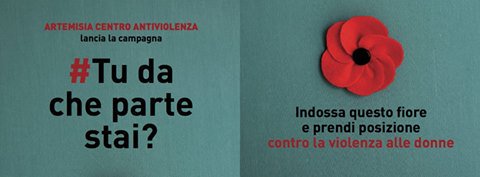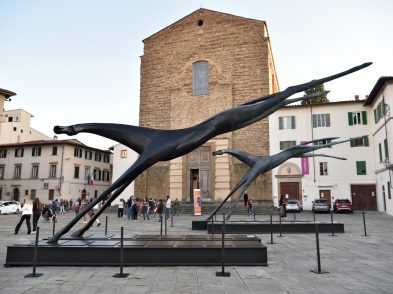I am sitting in a quiet room in the countryside, my windows open to a morning of fog with a slight chill on the air. I returned here last night after spending time with friends, and although I could leave here and easily find other people on the property to talk to, I’m choosing to remain in this room where the silence is only broken by the sound of the birds, and my company is a garden spider who visits at night that I’ve affectionately named Shakespeare. I am here because in this space it is only myself, and for this moment, the story that has just come to an end is mine and mine alone. I’m not ready yet to share it. At 20.24 yesterday evening my lawyer called to give me the news: the condemnation and sentence for the man who raped me in Florence during May 2013 had finally been confirmed by the highest court in Rome.
This is the first time in over four years that I am finally allowed to speak, the first moment in which my voice might be permitted in the public arena without risk of damaging my case. When you are raped, yours is the least told story, while others voices grow louder and louder, spinning tales and reasons and theories and lies that weave together into a fabric of falsehood that so many people truly believe. As victims, we are helpless against the onslaught of public opinion, gagged until such a time as a legal process may finally allow us some voice. As mine is finally freed, two more young women are losing theirs as a case is built against the Carabinieri accused of violating them.
I watched as the news broke after my rape, “Australian girl, student, raped in house of horrors”, knowing I was neither a student nor a girl, without any option to correct the reports without legal risk. I listened to the rumours that foreign women fake their sexual assaults in order to claim money for insurance, and spiralled into deep fear and panic that if I asked my insurance company to help cover my hospital bills and therapy it would weaken my case and the rapist would walk free. I listened as people tsk tsk’d and guessed what I might have been wearing and how drunk I was, knowing that I was raped on a sunny afternoon while wearing jeans, a t-shirt, no make up and my dirty hair in a ponytail, after agreeing to a drink with a man who accused me of being rude for trying to rush away to my next appointment. Knowing I didn’t do any of those “wrong” things, but still I was raped. Knowing I’d done all of those “wrong” things on other occasions, when I was never raped. Knowing all of those things are meaningless.
It was daylight, there were two other women at home in the apartment. A so-called “safe” situation, if rape myths are to be believed. And still, it happened. I’d gone there to look at a room advertised for rent to female students. The drink was drugged, I woke up the next day without my memory and with a damaged body. When I returned to that apartment in a state of confusion, needing to collect my lost belongings and trying to decipher what had happened, I was taunted by the man who showed me photos of the assault, photos I can still see in my mind, that flicker when I see my naked body from certain angles in the bathroom. I tried to escape the apartment, to steal the camera and run, but he chased me and my screaming alerted most of the neighbourhood who phoned the Carabinieri.
From that moment, my story was no longer my own. It belonged to neighbours gossiping in the streets, to newspapers reporting the scandalous crime, to the rapist inventing wild stories to evade conviction, to his lawyer pointing fiercely at me in a judge’s office as he attempted to brand me a liar, to well-meaning people full of advice about how I should handle each stage of my recovery, and how I shouldn’t, and the first man I went on a date with after years of recovery who told me, “Well, you didn’t see the bartender make this glass of wine I just bought you, so you haven’t learned”. My story was taken from me before I even had a chance to understand what had happened to me, as my traumatised brain flickered in and out of acceptance of what had happened, desperately trying to protect me from the full impact of what had happened, as is standard in trauma situations, while people outside wield this mind fragmentation as evidence that the victim is lying. Shock that lasted in varying degrees for months, as I navigated hospitals and lawyers and the legal system in a foreign language that I didn’t speak, unable to understand why the rapist was not arrested, why he remained on the streets for the majority part of four years, why I was helpless to avoid him coming to the piazza near my house in this last year where I watched him talking up young women, enlisting my friends to help try to warn them while having no legal right to do so. Terrified I’d ruin my own case, but also terrified he would rape other women and it would be my fault, because the legal system took no responsibility for protecting the public, not until the very last moment of the trial was over. Not until the day my lawyer called to say the result was upheld.
People have told me over and over again why I was raped, what my rape means, what my recovery should look like, how I should behave, how I should have behaved, how I should heal, how I should think, what my story should be, and the underlying theme of all of this advice is that the responsibility for my rape rests with me.
Perhaps it makes people feel safer, to blame a victim for the horror, because it gives us the illusion that if we just behave the correct way then these awful things can’t happen to us.
Perhaps we really believe that the problem is that young women just aren’t aware of the risks they’re taking, and if they were, they’d better avoid rape, even though women are warned from before puberty about this risk and trained for years in rape-avoidant behaviour.
Perhaps we are too scared to acknowledge that if rape is really the fault of rapists, and is really as prevalent as it is, then we are sure to know rapists personally, and they may turn out to be people that we love.
Perhaps the scale of the problem is so vast that we are too terrified to allow it to be true, and so we deny its true cause, continuing to relocate blame onto victims, like climate change deniers insisting they are only stand alone freak weather events.
If we truly convince ourselves that it is the victim’s fault, then we are also off the hook for our lack of action. We can deny any responsibility for our failure to look deeper inside of ourselves and see how we all contribute to a culture in which rape flourishes with very little consequence for rapists. Perhaps we’ve just been telling that old victim-blaming story for so long, we don’t even realise we’re doing it. Perhaps it’s understandable, but it is not acceptable or excusable anymore. Because it has real, and very harmful, impacts. They are not “just words”. They change the actions of victims, empower rapists, and have real tangible impacts on the ability to achieve legal justice and personal recovery.
While we continue to focus on “what victims did to get themselves raped”, we take no responsibility for changing our culture and our streets to be safer. We fail, again and again, to do anything to protect vulnerable members of our community. My successful legal outcome is an outlier. A huge part of my therapy was spent separating my recovery from any hope of legal justice. Because the truth is that most rapists will never face charges, let alone see a single day in prison.
So here I sit, in a quiet room in the countryside, with the newly gifted freedom to tell my side of the story, and yet I am still terrified of what might happen if I dare to speak. Terrified that I will begin a flood of people searching through my past and my life to find reasons to turn blame back on me, to reject my words, to argue against my truths, to tell me again why I am wrong, why I am the problem, and why nothing needs to change, nothing can be done, nothing needs to be done because “this is just the way that it is”.
I am afraid.
So I sit in this room where for the moment I am safe, listening to the birds and smiling at a spider, enjoying this brief but beautiful window where no one else can touch my story except for me. A brief moment where no one else knows the outcome but the rapist and myself, and just for a second, a truth exists suspended in time. Later, I will send this article in an email. Later, I will tell my loved ones. Later, I will armour myself, preparing for what may come. But for now, this cold morning and the news of legal victory are only for me.
–
If you are a survivor of sexual assault in Florence and Tuscany and would like to have your voice heard via The Florentine, please write to redazione@theflorentine.net
–

On the United Nations International Day for the Elimination of Violence Against Women, join the movement to combat violence against women by supporting organizations such as the Artemisia Centro Antiviolenza and its #tudachepartestai awareness campaign.
Updated November 6, 2018








